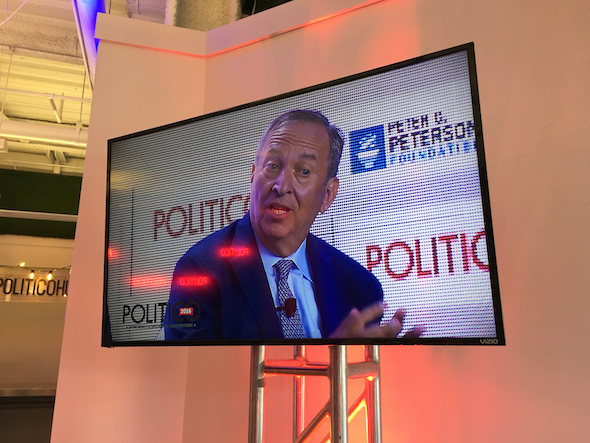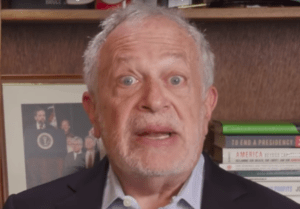Robert Scheer Questions Lawrence Summers and Michael Blumenthal on the 2008 Financial Crash (Video)
On Day 3 of the Democratic National Convention, Truthdig's editor in chief confronted the two former Treasury secretaries about the role financial deregulation played in the Wall Street crash. On Day 3 of the Democratic National Convention, Truthdig's editor in chief confronted the two former Treasury secretaries about the role financial deregulation played in the Wall Street crash.
Lawrence Summers served as director of the National Economic Council under President Obama. (Alexander Kelly)
Truthdig Editor in Chief Robert Scheer began Day 3 of the Democratic National Convention attending Politico’s “Economy and the Election” conference. There, he took the opportunity to speak with two former Treasury secretaries: Lawrence Summers, who worked under Bill Clinton, and Summers’ predecessor Michael Blumenthal, who served in Jimmy Carter’s administration. Accompanied by Truthdig Associate Editor Alexander Kelly, who filmed the discussions, Scheer questioned both former secretaries about economic policies that led to the 2008 financial crash.
Scheer spoke first with Summers, in an exchange that quickly grew tense. Scheer has previously written about Summers’ role in the 2008 financial meltdown in his book “The Great American Stickup.” In it, Scheer said:
While much has been made of the baffling complexity of the new market structures at the heart of the banking meltdown, there were informed and prescient observers who in real time saw through these gimmicks. The potential for damage was thus known inside the halls of power to those who cared to know, if only because of heroines like gutsy regulator Brooksley Born, chair of the Commodity Futures Trading Commission from 1996 to 1999. When they attempted to sound the alarm, however, they were ignored, or worse. Simply put, the rewards in both financial remuneration and advanced careers were such that those in a position to profit went along with great enthusiasm. Those who objected, like Born, were summarily crushed. …
Of the leaders responsible, five names come prominently to mind: Alan Greenspan, the longtime head of the Federal Reserve; Robert Rubin, who served as Treasury secretary in the Clinton administration; Lawrence Summers, who succeeded him in that capacity; and the two top Republicans in Congress back in the 1990s dealing with finance, Phil Gramm and James Leach.
Summers was on a panel Wednesday defending the reversal of the Glass-Steagall Act. The repeal of the act, as Scheer has argued, led to the collapse of Wall Street and the financial meltdown because it permitted investment banks to gamble with depositors’ money held in affiliated commercial banks. “Clinton signed off on the reversal of the Glass-Steagall Act, the legislative jewel of the Franklin Roosevelt administration designed to prevent financial institutions from getting too big to fail,” Scheer once wrote. “The first beneficiary of that legislation was Citigroup, a corporation that resulted from a merger that would have been banned by Glass-Steagall.” Scheer continues:
So much for the “modernizing” that Clinton had bragged about.
A year later a variation of that same word appeared in the title of the Commodity Futures Modernization Act, which Clinton signed and which exempted from government regulation all of the collateralized debt obligations and credit default swaps that would later prove so toxic. That legislation led to the explosion of the market in unregulated mortgage-based securities, the key source of the financial-sector “dealmaking” that Clinton now bemoans.
After the Politico panel ended, Scheer confronted Summers. “Without Glass-Steagall, Goldman Sachs would not have been able to become a commercial bank, right?” Scheer asked. “Isn’t it Glass-Steagall that allowed Goldman Sachs to change its status?”
“I don’t think we’re going to agree,” Summers responded. As Scheer began to ask him about the Commodities Futures Modernization Act, Summers said, “I think we’re done.”
Shortly after Scheer and Summers’ terse conversation, Scheer spoke with Blumenthal. “Nobody talks about the Commodities Futures Modernization Act,” Scheer said. “Don’t you think that’s something that should be discussed?”
“I think it should be discussed,” Blumenthal responded. “There’s still a lot of work to be done in that area.”
Scheer wrapped up by giving a summary of the events. He called the panel “fascinating” and reviewed his confrontation with Summers. He is “more responsible for the economic mess in this country than any single human being,” Scheer said. “He was an acolyte of Robert Rubin.” Scheer noted that when Summers was asked about the reversal of Glass-Steagall during the Politico panel, he said that the act didn’t really apply to what had happened. But, Scheer said, he “distorted the picture.” Watch the conversations and Scheer’s analysis below:
—Posted by Emma Niles
Your support matters…Independent journalism is under threat and overshadowed by heavily funded mainstream media.
You can help level the playing field. Become a member.
Your tax-deductible contribution keeps us digging beneath the headlines to give you thought-provoking, investigative reporting and analysis that unearths what's really happening- without compromise.
Give today to support our courageous, independent journalists.







